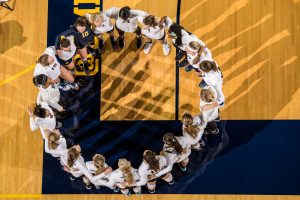 Athletes Connected is compiling a set of resources for student-athletes for coping during the COVID-19 pandemic. This story is about adjusting to isolation with some helpful positive self-talk when you’re feeling anxious or overwhelmed.
Athletes Connected is compiling a set of resources for student-athletes for coping during the COVID-19 pandemic. This story is about adjusting to isolation with some helpful positive self-talk when you’re feeling anxious or overwhelmed.
- Effective Learning Strategies Away from the Classroom
- Athlete’s Guide to Coping During the COVID-19 Pandemic
By Nick Velissaris, Ph.D., Athletic Counseling Team Clinical Neuropsychologist
Over the past few weeks, our lives have shifted in ways we could never have expected. While there have been many resources and notifications for what we have to do to prevent transmission and remain safe, there have been very few offering guidance on how we can maintain our daily lives with the same success we had pre-isolation.
Quarantine and social distancing do not just change human interaction. They impact our routine, schedule, motivation, structure, and productivity needed to remain a successful student-athlete.
Feeling anxious or overwhelmed?
Here’s some self-talk:– “this is happening to everybody”
– “this is temporary”
– “we compete against others”
– “same as it was before isolation”
Coaches and trainers have provided workouts to maintain fitness in isolation. Social media and various apps have allowed for improved socialization and mental health. Online classes and technology allow for continued lectures, classes, and exams.
Nevertheless, completing these workouts, engaging with others online, and being a successful student in isolation relies much more on self-initiation and self-motivation. Support systems such as a strict schedule, attendance policies, team rules, study table, tutors, office hours, etc. are wonderful resources for learning, but a byproduct of having such advantages can be the perceived difficulty when they are not available.
So what can we do to maintain some consistency and comfort in learning when everything feels like it has changed so drastically overnight?
In this week’s stories, we address how you can adapt to isolation (today) and offer certain strategies to assist you in your academic learning (Wednesday, April 1).
Adjust Your Perspective
Optimal learning is significantly reduced by anxiety caused by crisis situations. Coping with stress in a positive way can minimize the impact a crisis situation can have on our ability to learn. When negative things happen to us, we tend to catastrophize the outcomes to make things seem worse than they actually are.
This is evolutionary, adaptive, and automatic; it’s what has allowed mankind to continue and thrive as it has. We would not have lasted very long if it were our automatic response to say, “Nope, I bet that bear walking in our cave just wants to be friends.” Instead, our brains make us think of bad outcomes so we go into “alert mode” and remain safe.
This is perceived as anxiety/stress. Fortunately, our brains work in both directions and we can think, make adjustments to our initial thoughts, and respond to those adjustments to reduce the impact of that stressor.
We initially go into alert mode with any drastic or abrupt change. Because of this automatic response, it may be helpful to first challenge that initial reaction and evaluate how much has actually changed.
It is also important to identify what has not changed. Try to remind yourself of the following when you begin to feel stressed and overwhelmed due to the current situation:

- It is easy to focus on ourselves and the loss or inconveniences you have personally experienced…but remember this is happening to everybody.
- Sometimes it can be automatic to look at the situation you are experiencing and ignore that this is temporary… you don’t need to accept this lifestyle forever, just until the problem is fixed.
- Remember that in our lives, we compete against others. Upset that you can’t train? Upset you need to study and don’t have the academic buildings or resources you had?
- Well… so is every other student in your classes and athlete you compete against. The changes impact you the same as your competition, so the impact of this change between you and who you are competing against is the same as it was before isolation.
- All the changes seem so drastic and different from what you did to become successful… but remind yourself that, as an athlete, you are already very skilled in adapting and persevering through difficulty.
- You have had to battle injuries and take exams on the road, deal with daily fatigue from training, morning practices before sunrise, keep up with nutrition and sleep, the media, teammates depending on you, etc., but you still were graded the same way as regular students in the classroom.
- Before isolation, you faced the additional challenges that come with being student-athlete and were successful.
Accept there are new challenges outside your comfort zone, but everyone is facing them, it won’t last forever, and you can overcome challenges better than anyone.
The bold statements can be used as self-talk when feeling anxious or overwhelmed.
In Wednesday’s article, we will tackle ways in which you can create a positive learning environment and utilize repetitive learning.
Additional Resources
- Athletes Connected Get Support Page
- Athletes Connected Featured Videos and Coping Skills Videos
- University of Michigan COVID-19 Update
- Michigan Medicine Disease Alerts
- Flattening the Curve for COVID-19: What Does it Mean and How Can You Help?
 About the Author
About the Author
Nick Velissaris, Ph.D., is a clinical neuropsychologist and athletic counselor with the University of Michigan Athletic Counseling Team. He has been at the University of Michigan since March 2019 and specializes in assessing and improving the cognitive, emotional, and behavioral functioning of our athletes. He holds two master’s degrees (clinical-behavioral psychology, clinical psychology) and a Ph.D. in clinical psychology with specialization in neuropsychology. Dr. Velissaris is a Michigan graduate and was a varsity letterwinner in wrestling.


 Keep a Routine
Keep a Routine Ply Your Trade
Ply Your Trade About the Author
About the Author